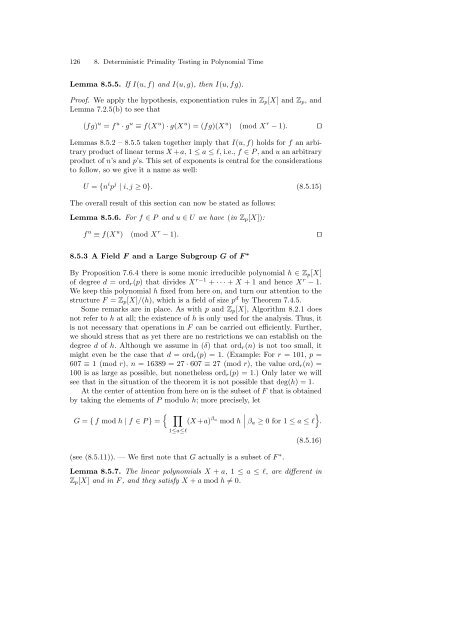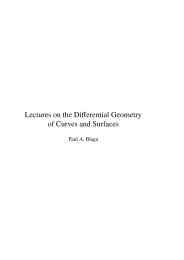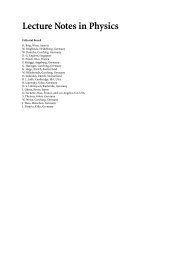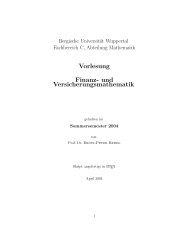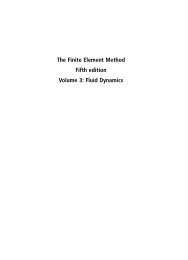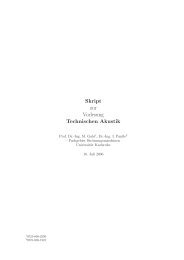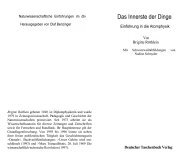Dietzfelbinger M. Primality testing in polynomial time ... - tiera.ru
Dietzfelbinger M. Primality testing in polynomial time ... - tiera.ru
Dietzfelbinger M. Primality testing in polynomial time ... - tiera.ru
You also want an ePaper? Increase the reach of your titles
YUMPU automatically turns print PDFs into web optimized ePapers that Google loves.
126 8. Determ<strong>in</strong>istic <strong>Primality</strong> Test<strong>in</strong>g <strong>in</strong> Polynomial Time<br />
Lemma 8.5.5. If I(u, f) and I(u, g), thenI(u, fg).<br />
Proof. We apply the hypothesis, exponentiation <strong>ru</strong>les <strong>in</strong> Zp[X] andZp, and<br />
Lemma 7.2.5(b) to see that<br />
(fg) u = f u · g u ≡ f(X u ) · g(X u )=(fg)(X u ) (mod X r − 1). ⊓⊔<br />
Lemmas 8.5.2 – 8.5.5 taken together imply that I(u, f) holdsforf an arbitrary<br />
product of l<strong>in</strong>ear terms X +a, 1≤ a ≤ ℓ, i.e., f ∈ P ,andu an arbitrary<br />
product of n’s and p’s. This set of exponents is central for the considerations<br />
to follow, so we give it a name as well:<br />
U = {n i p j | i, j ≥ 0}. (8.5.15)<br />
The overall result of this section can now be stated as follows:<br />
Lemma 8.5.6. For f ∈ P and u ∈ U we have (<strong>in</strong> Zp[X]):<br />
f u ≡ f(X u ) (mod X r − 1). ⊓⊔<br />
8.5.3 A Field F and a Large Subgroup G of F ∗<br />
By Proposition 7.6.4 there is some monic irreducible <strong>polynomial</strong> h ∈ Zp[X]<br />
of degree d =ordr(p) that divides X r−1 + ···+ X + 1 and hence X r − 1.<br />
We keep this <strong>polynomial</strong> h fixed from here on, and turn our attention to the<br />
st<strong>ru</strong>cture F = Zp[X]/(h), which is a field of size p d by Theorem 7.4.5.<br />
Some remarks are <strong>in</strong> place. As with p and Zp[X], Algorithm 8.2.1 does<br />
not refer to h at all; the existence of h is only used for the analysis. Thus, it<br />
is not necessary that operations <strong>in</strong> F can be carried out efficiently. Further,<br />
we should stress that as yet there are no restrictions we can establish on the<br />
degree d of h. Although we assume <strong>in</strong> (δ) thatordr(n) is not too small, it<br />
might even be the case that d =ordr(p) = 1. (Example: For r = 101, p =<br />
607 ≡ 1(modr), n = 16389 = 27 · 607 ≡ 27 (mod r), the value ordr(n) =<br />
100 is as large as possible, but nonetheless ordr(p) = 1.) Only later we will<br />
see that <strong>in</strong> the situation of the theorem it is not possible that deg(h) =1.<br />
At the center of attention from here on is the subset of F that is obta<strong>in</strong>ed<br />
by tak<strong>in</strong>g the elements of P modulo h; more precisely, let<br />
� �<br />
G = { f mod h | f ∈ P } = (X +a) βa �<br />
�<br />
�<br />
mod h � βa ≥ 0for1≤a≤ ℓ .<br />
1≤a≤ℓ<br />
(see (8.5.11)). — We first note that G actually is a subset of F ∗ .<br />
(8.5.16)<br />
Lemma 8.5.7. The l<strong>in</strong>ear <strong>polynomial</strong>s X + a, 1 ≤ a ≤ ℓ, are different <strong>in</strong><br />
Zp[X] and <strong>in</strong> F , and they satisfy X + a mod h �= 0.


